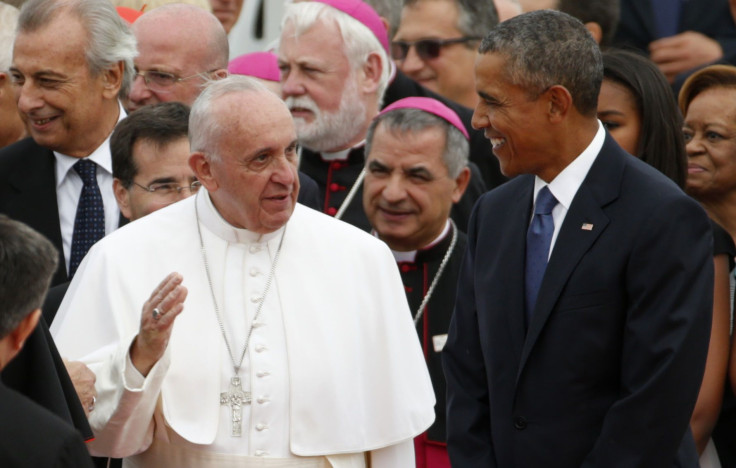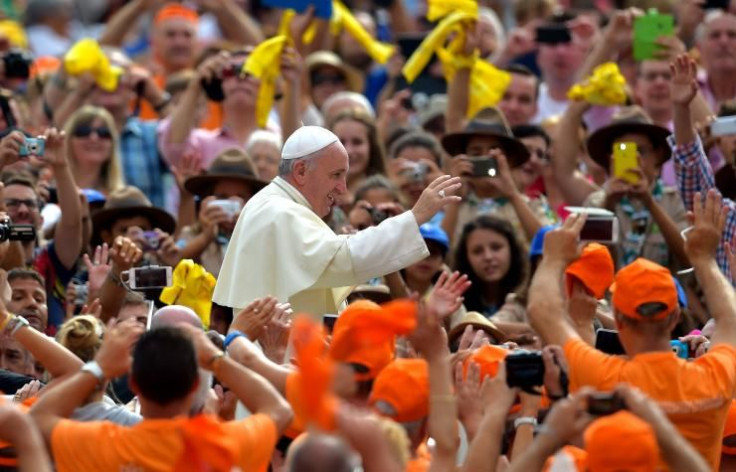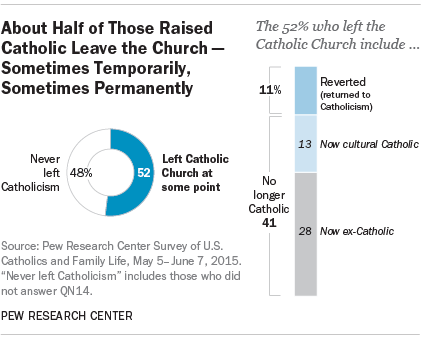Why Is Pope Francis Coming To The US? Historic Visit Marks Strategic Appeal To America’s Conscience

Known as the “pope of the periphery,” Pope Francis has spent his papacy focusing on the most marginalized segments of society. Even his choices of destinations for international visits have reflected that priority. On his most recent trip to Latin America, he eschewed his home country of Argentina for the poorer nations of Bolivia, Ecuador and Paraguay. But on Tuesday, the pope found himself about as far from the periphery as he could get when he landed in the United States, the nexus of global capitalism.
Nexus or no, analysts say the historic trip is simply an extension of his peripheral philosophy. Pope Francis, they say, will call attention to the issues he has prioritized all along -- aid for the poor, the environment, the margins of society -- in an effort to sway the world’s superpower to his side.
“More than anything else, the pope is hoping to reframe, both for American Catholics and people of goodwill across the country, all of these issues in the contemporary world in a kind of moral dimension,” said Stephen F. Schneck, director of the Institute for Policy Research and Catholic Studies at the Catholic University of America. “The U.S. is a central figure in so many of these issues he's passionate about. He’s going to call on Americans’ conscience.”
Indeed, Francis has not shied away from using his pulpit as a platform to denounce economic inequality, consumerist culture and the abuses of global capitalism that prize “profit at any price.” He also has urged reform on a number of issues ranging from the environment to immigration and the refugee crisis.
Jesuit priest Thomas Reese, a senior analyst for the National Catholic Reporter and author of “Inside the Vatican: The Politics and Organization of the Catholic Church,” agrees Francis' U.S. visit serves as a strategic platform for him to advance the causes he has been preaching about since he became pope.
“The United States is the richest and most powerful country in the world, and it is incredibly blessed by God. The pope is going to ask, ‘What are you doing with all these gifts? Are you going to be a force for good in the world? Or are you going to create problems in the world? Or are you going to try to be a gated community and ignore everything that happens outside your border?’ He also has the advantage that people like him and respect him, and as a result, they’re going to be open to listening to him,” said Reese.
Indeed, a Washington Post-ABC News poll released Sunday found 70 percent of Americans have a favorable view of Pope Francis. Among American Catholics, the number is even higher; 86 percent rate the pope positively.

Balancing Power With The Periphery
And while Francis plans to swing through the halls of power during his visit -- he will be greeted by President Barack Obama, will be the first pope to address a joint session of Congress and will speak at the United Nations -- his itinerary has been carefully orchestrated to balance the powerful with the powerless. Sprinkled throughout his six-day trip are meetings with the homeless, the hungry and even the imprisoned.
“If there is an overarching theme of this trip, it’s reconciliation,” said Austen Ivereigh, author of “The Great Reformer: Francis and the Making of a Radical Pope,” a biography of Francis. “Just look at the choreography of the trip. Right after addressing Congress, he’s speaking on the homeless. He is connecting the center with the periphery, which is what he’s always done.”
(After leaving the Capitol, Francis will head to St. Patrick’s Catholic Church in Washington and the Catholic Charities of the Archdiocese of Washington.)
But if either Democrats or Republicans hope to claim the pope for their own, they are mistaken. While Francis has taken emphasis away from certain social issues like homosexuality and abortion, he has not changed church doctrine on these policies.
A Church In Transition
The pope’s visit also is about tending to his own flock, experts say. The United States is home to the fourth-largest Catholic population in the world and is a powerful arm of the Catholic Church. But those numbers are diminishing. Fewer infants are being baptized into the church -- just 694,000 in 2014, down from 1.3 million 50 years ago. Confirmations and first communions also have seen sharp declines. Only about 1 in 3 adult Catholics attend Mass. And a Pew survey found that about half of those raised in the Catholic Church leave it at some point.

These are troubling figures for the church, says Andrew Chesnut, a professor of religious studies at Virginia Commonwealth University and an expert on the Catholic Church.
“There is a declining Catholic membership, particularly in the Americas. The U.S. is part of the dynamic of Catholic losses. The pope’s job number one really is evangelization -- reaching out to lapsed Catholics and converting new people,” said Chesnut.
It doesn’t hurt that Francis, a native Spanish speaker originally from Argentina, is especially admired by the Hispanic contingent of American Catholics.
“His trip is pastoral but also strategic. Between 35 and 40 percent of Catholics in the United States are Latinos,” said Chesnut. “The future of the Catholic Church in the U.S. is a Latino one.”
“It’s definitely a church in transition,” said Ivereigh, who added that immigration -- an issue the pope is sure to address during his visit -- is transforming the Catholic Church in the U.S. “The impact of a visit of a pope from Latin America will have an effect.”
© Copyright IBTimes 2024. All rights reserved.





















